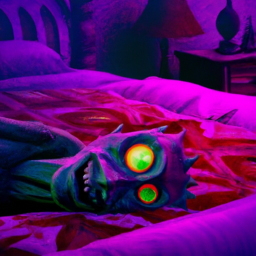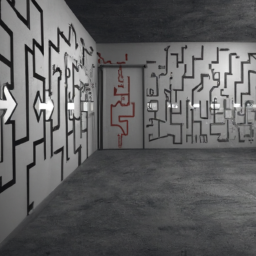Have you ever woken up from a nightmare, drenched in sweat, with a feeling that something sinister was hiding in the shadows?
I remember a time when I had a recurring dream about a demonic figure chasing me through a dark forest. It left me feeling scared and helpless every time I woke up.
While it’s easy to dismiss such dreams as mere figments of our imagination, they could hold a deeper meaning that deserves our attention. Demonic dreams can be unsettling and frightening, but they also have the potential to reveal hidden aspects of ourselves and our subconscious fears.
In this article, we’ll explore what it means to have demonic dreams, the symbolism behind them, and ways to cope with them. Whether you believe in the supernatural or not, understanding these dreams can help you confront your deepest fears and anxieties.
So, let’s dive in and explore the world of demonic dreams.
Key Takeaways
- Demonic dreams can reveal hidden aspects of ourselves and our subconscious fears.
- The symbolism of demons in these dreams can help make sense of unsettling experiences.
- Demons in these dreams represent negative emotions and experiences that need to be confronted.
- Trauma, stress, substance abuse or withdrawal, sleep disorders, and medications can trigger demonic dreams, so seeking help and support is important for coping with them.
Understanding the Symbolism of Demons
You’re probably feeling scared and confused when you have demonic dreams, but understanding the symbolism of demons can help you make sense of these unsettling experiences.
Demons are often associated with negative emotions, such as fear, anger, and anxiety. In dreams, they can represent our inner demons or the negative aspects of our personality that we need to confront and overcome.
It’s important to remember that demons are not always a literal representation of evil forces. Instead, they can represent a variety of negative emotions and experiences that we need to confront in order to move forward.
By understanding the symbolism of demons in our dreams, we can begin to understand the underlying messages and themes that our subconscious is trying to communicate. This can help us identify common themes and motifs in demonic dreams, which we’ll explore in the next section.
Common Themes and Motifs in Demonic Dreams
When experiencing these types of visions, it’s not uncommon to be plagued by visions of hellish landscapes and menacing entities. These dreams often feature common themes and motifs that can help us understand what our subconscious is trying to tell us.
Some of the most prevalent themes include feeling trapped or powerless, being pursued or attacked by demons, and experiencing vivid and terrifying hallucinations.
It’s important to remember that these dreams don’t necessarily mean that we’re being haunted or possessed by demons. Rather, they may be a manifestation of our fears and anxieties in waking life.
In the next section, we’ll explore some possible triggers for demonic dreams and what we can do to prevent them.
Possible Triggers for Demonic Dreams
I’ve been having some really unsettling dreams lately, and I’ve been trying to figure out what might be causing them.
After doing some research, I’ve learned that there are several possible triggers for demonic dreams. These include experiencing trauma or stress, using or withdrawing from substances, and having sleep disorders or taking certain medications.
It’s important to identify these triggers in order to address the underlying issues and hopefully alleviate the disturbing dreams.
Trauma or Stress
Experiencing traumatic events or prolonged stress can often lead to unsettling dreams that may manifest as demonic or sinister in nature. Here are some possible reasons why:
- The brain is processing unresolved emotions and memories from the trauma or stress.
- Anxiety and fear are heightened, leading to more intense dreams.
- Sleep disturbances caused by the trauma or stress can disrupt the normal sleep cycle, leading to more nightmares.
- The trauma or stress may have triggered a spiritual crisis, leading to dreams with religious or demonic themes.
It’s important to seek help and support if you’re experiencing these types of dreams, as they can be distressing and impact your overall well-being. Substance abuse or withdrawal can also contribute to disturbing dreams, which we’ll explore in the next section.
Substance Abuse or Withdrawal
Substance abuse or withdrawal can lead to terrifying nightmares, even for those who don’t typically experience such dreams.
I never used to have nightmares, but after struggling with addiction and going through withdrawal, I found myself plagued by disturbing and vivid dreams. It was as though my subconscious was trying to process the chaos and pain I had been inflicting on myself.
These demonic dreams were a wake-up call for me to address my addiction and get the help I needed. It wasn’t just the physical withdrawal symptoms that were affecting me, but the psychological toll as well.
I learned that substance abuse can have long-lasting effects on the brain and can even alter the way we dream. It was a difficult and painful journey, but with the help of professionals and a support system, I was able to overcome my addiction and find peace in my dreams once again.
Now, let’s explore how sleep disorders or medications can also impact our dreams.
Sleep Disorders or Medications
Sleep disorders or medications can greatly affect the content and intensity of our dreams, leading to unexpected and sometimes unsettling experiences during sleep. For instance, sleep apnea and snoring can cause disruptions in breathing, which may trigger vivid and frightening nightmares. Similarly, medications such as antidepressants, antipsychotics, and beta blockers can alter brain chemicals and affect REM sleep, resulting in bizarre and surreal images that may resemble demonic activities.
To better understand the relationship between sleep disorders, medications, and dreams, consider the following table:
| Sleep Disorder/Medication | Dream Effects |
|---|---|
| Sleep apnea/snoring | Vivid and frightening nightmares |
| Antidepressants | Surreal and bizarre images |
| Antipsychotics | Dark and intense dreams |
| Beta blockers | Disjointed and confusing dreams |
As you can see, there are many potential effects that sleep disorders and medications can have on the content and intensity of our dreams. Therefore, it is important to talk to a healthcare professional if you are experiencing unusual or disturbing dreams. By identifying and addressing the underlying causes, you may be able to reduce the frequency and severity of demonic dreams.
Coping Strategies for Dealing with Demonic Dreams
When grappling with demonic dreams, it can feel like navigating a dark and twisted maze, but finding healthy coping strategies can help guide you towards the light.
One strategy is to practice relaxation techniques before bed, such as meditation or deep breathing exercises, to calm the mind and promote a peaceful sleep. It may also be helpful to keep a dream journal and write down any recurring themes or symbols in the dreams, as this can provide insight into the subconscious mind and allow for processing and understanding of the dreams.
Another coping strategy is to seek support from a trusted friend, family member, or therapist. Talking about the dreams and any related fears or anxieties can provide a sense of relief and comfort. Additionally, practicing self-care activities such as exercise, healthy eating, and engaging in enjoyable hobbies can improve overall well-being and reduce stress levels, which may contribute to the occurrence of demonic dreams.
Remember that while these dreams can be frightening, they don’t define your worth or character, and it’s possible to find peace and healing through healthy coping strategies.
Frequently Asked Questions
Are demonic dreams a sign of possession or spiritual attack?
Demonic dreams may not necessarily be a sign of possession or spiritual attack. They could be a manifestation of my subconscious fears or anxieties. It’s important to seek guidance from a mental health professional or spiritual advisor for interpretation and support.
Can demonic dreams be a result of medication or substance use?
I’ve had terrifying demonic dreams while on medication. It scared me to think my own mind could conjure such evil. It’s possible that medication or substance use can trigger these dreams, but it’s best to consult a doctor.
Is it possible to communicate with demons through dreams?
I don’t believe it’s possible to communicate with demons through dreams. Dreams can be influenced by our subconscious thoughts and fears, but it’s important to seek professional help if you’re experiencing recurring demonic dreams.
Are there any spiritual practices that can prevent or reduce demonic dreams?
I’ve found that regularly practicing meditation and setting clear intentions before sleeping has reduced my frequency of unpleasant dreams. It’s like creating a protective bubble around my mind, preventing negative energies from seeping in.
Can demonic dreams be a manifestation of repressed emotions or psychological issues?
Yes, demonic dreams can be a manifestation of repressed emotions or psychological issues. It’s important to address any underlying stress or trauma to reduce the likelihood of these dreams. Seek professional help if necessary.
Conclusion
Well, that was quite an eerie journey. Demonic dreams can be a terrifying experience, leaving you feeling helpless and vulnerable. The symbolism of demons in dreams can represent many things, such as fear, anxiety, or even an inner battle with oneself.
It’s important to understand the common themes and motifs in these dreams to better comprehend their meaning. Possible triggers for demonic dreams can range from watching a horror movie before bed to experiencing a traumatic event. Coping strategies, such as journaling or talking to a therapist, can help alleviate the fear and anxiety associated with these dreams.
Remember, though these dreams may be disturbing, they don’t have to control or define you. Face your fears head-on, and you may just conquer your inner demons.









